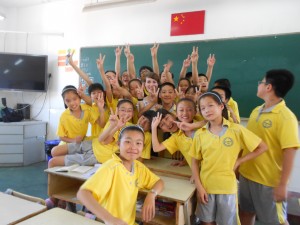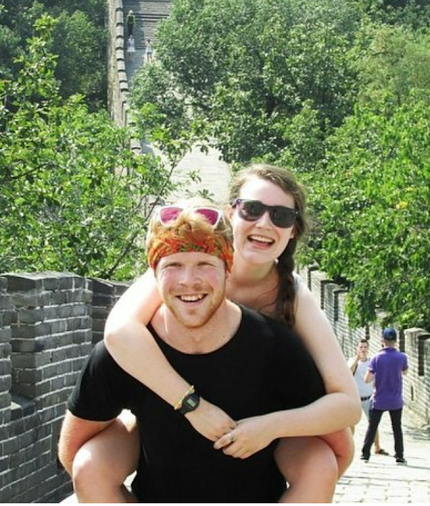
Helena Jane is a Sheffield University graduate who worked in Shanghai (2014-2015) as part of the 10/12 month paid teaching programme.
Every two weeks added a picture as well as a story to the Facebook album 20 Fortnights as a Full-time Teacher on our Facebook page. The stories highlight the highs, lows, adventures of a teacher in China and are designed to give a little taste of what living and working in China is really like.
Helena also took part in the summer teaching programme in 2013 when she was based in Haining.
Below an interview about her experiences in Haining.
Describe an average day at school
I got up at 6:45 am every day and ate breakfast in the hotel before heading over to school for my first lesson at 8.00 am. I had five lessons every day but the length of my days would alternate. One day my lessons would be really spread out until the last lesson at 5:10pm, the next day they would be intense with no small breaks until 2:40 pm when I’d finish and have the rest of the day to myself. The other teachers and I would all have lunch at the school every day between 11:10 am and 2.00 pm. This was great as it gave you a chance to relax, catch up with the other teachers or write a lesson plan.
What was the level of the students?
I taught five classes between Grades 3 – 5 which meant that the children I taught were aged between 9 and 12. Their ability varied a lot, but you quickly learnt which children needed slightly simpler tasks and which needed a bit more of a challenge. Often, when planning for classes, I’d pick a topic for the day, like the solar system or family, and then I’d work out some activities that would work for three different ability ranges using more or less vocab, or simpler or more complex role play exercises.
What was the language barrier like and how did you deal with it?
In all honesty it was really difficult, because it’s not as easy to pick up as, say, French or Spanish. However, the teaching assistants (and, on occasions, the children and also the shopkeepers) couldn’t have been more helpful in translating and I never felt unsupported, in our outside the classroom. Once a week the teaching assistants would club together and run incredibly useful night classes for the foreign teacher to practise key words and phrases to help us teach the kids and get by in day to day life. Some of the helpers already had quite good Mandarin and some arrived with none, but as with most languages, as long as you adopt a ‘can do’ attitude and are willing to try your best to pick up some very basic words, then the people you meet will be thrilled. Sometimes it takes as little as, “ni hao” (hello) for a Chinese person to break into a smile and tell you that your Mandarin is brilliant!
What did you do in the evenings after school?
Our school was very proactive in organising after school activities. We attended an opening ceremony, where the other teachers and I were presented with flowers, and throughout the course of the two weeks we also had a school disco, a concert, two Mandarin classes and a closing ceremony. Outside the school gates we were a pretty social bunch, with lots of trips into town and the odd film night or chilled beer in the hotel lobby. By the end of our placement everyone had formed a little friendship group to travel with, which was great.
Do you think the placement is good for people looking to go into teaching?
This placement is ideal for people who are thinking of going into teaching, but it’s also just as good for people who aren’t. The fact that the placements on offer require no teaching or child care qualifications mean that anyone can apply. The transferrable skills you gain from this kind of experience are invaluable, they include being well organised, but also being able to think on your feet. The placement also helps to develop personal qualities such as patience and tolerance and is a really good confidence booster. It’s also a great experience for people if they’re not yet sure, like me, where life will lead them.
What did you do after your placement?
When booking flights I took the attitude that once I was in China I’d stick around for as long as possible and really experience it. You never know when you’re going to be able to go back again! Straight after my placement I went on a day trip to Hangzhou to see the famous lake there. Then I went to Beijing (picture above) with a big group of teachers for a quick three day stint before getting the overnight train to Xi’an to see the Terracotta Warriors and climb Huashan’s East Peak . After Xi’an, we split into smaller groups and I spent a glorious week with three other girls exploring, relaxing and getting to know the little city of Kaifeng in the Henan province. Before the girls flew home from Shanghai we took a detour via the mountains of Huixian, home of the Guoliang Tunnel. This place was idyllic; we were surrounded by mountains and greenery. Despite the fact that it’s in the Lonely Planet guide book, it was quiet enough to make it seem like a hidden gem. Once the girls had flown home I stayed in Shanghai for two weeks and then Beijing for the following two weeks, ticking off everything I wanted to see (the Forbidden City, the Summer Palace, the Bund…) and so, so many more. Staying in hostels most of the time meant that I met many fantastic new people who were always up for a day trip.
Would you go back to China?
If you offered me a flight tomorrow I wouldn’t hesitate! The kids were a joy to be around, so smiley and enthusiastic. In terms of China as a country, it’s the most interesting and wonderful place I’ve ever been. There is always something to see or do and it’s hard not to fall in love with the culture, however different to ours it seems at first. I was so lucky to get the opportunity to go; I can’t recommend it highly enough.
By Helena Jane, summer internship in Haining, 2013



Leave A Comment
You must be logged in to post a comment.